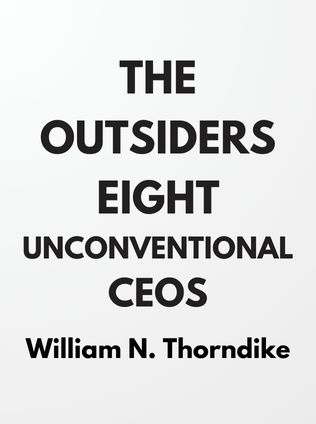
The Outsiders: Eight Unconventional CEOs
Eight Unconventional CEOs and Their Radically Rational Blueprint for Success
By William N. Thorndike
Published 01/2012
About the Author
William N. Thorndike, Jr. is a seasoned investor and a keen observer of business management. As the founder of Housatonic Partners, a private equity firm, Thorndike has spent decades analyzing what makes companies and their leaders successful. His investment experience provided him with a unique lens through which he could examine corporate leadership. In "The Outsiders: Eight Unconventional CEOs and Their Radically Rational Blueprint for Success," Thorndike turns his attention to the CEOs who defied traditional management norms and achieved remarkable success. His work is informed by his deep understanding of financial markets, corporate strategy, and the nuances of leadership.
Thorndike’s approach is analytical yet accessible. He delves into the specifics of what set these CEOs apart, offering readers a guide to thinking differently about business leadership. His writing is not only a study of past successes but also a roadmap for future leaders who wish to break free from conventional wisdom and achieve extraordinary results.
Main Idea
The central thesis of "The Outsiders" revolves around the idea that exceptional business performance often comes from unconventional approaches to leadership, particularly in capital allocation. Thorndike identifies eight CEOs who, despite operating outside the mainstream, consistently outperformed their peers and the broader market. These leaders, including icons like Warren Buffett and Henry Singleton, approached their roles with a mindset more akin to that of an investor than a traditional manager. Their decisions were guided by a relentless focus on shareholder value and long-term success, rather than short-term gains and corporate growth for its own sake.
Thorndike argues that the success of these outsider CEOs was not due to luck or unique circumstances but was instead the result of their strategic thinking, frugality, and disciplined approach to capital allocation. By examining their management practices, Thorndike provides a compelling case for why thinking differently—and acting on that different thinking—can lead to extraordinary outcomes in the business world.
Table of Contents
- Introduction: The Case for Unconventional CEOs
- Chapter 1: Capital Allocation - The CEO’s Most Important Job
- Chapter 2: Decentralization and Management Practices
- Chapter 3: Frugality and Focus on Cash Flow
- Chapter 4: Shareholder Returns and Minimal Investor Relations
- Chapter 5: The Role of Luck and the Power of Flexibility
- Chapter 6: Independent Thinking and Simplifying Decisions
- Chapter 7: Personality Traits of Outsider CEOs
- Conclusion: Lessons for Modern CEOs
Introduction: The Case for Unconventional CEOs
In the introduction, Thorndike presents a compelling argument for why certain CEOs, whom he dubs "outsiders," have been able to achieve results that far exceed those of their peers. These CEOs are not household names, nor are they typically celebrated in the mainstream business press. However, their impact on the companies they led is undeniable. The introduction serves as both an overview of the key themes of the book and a call to action for current and aspiring CEOs to rethink the way they approach their roles.
Thorndike challenges the conventional wisdom that has dominated corporate leadership for decades. He argues that by following the same strategies as everyone else, CEOs are bound to achieve average results at best. To truly excel, CEOs must be willing to break from tradition and adopt unconventional strategies. This theme of breaking from the norm is woven throughout the book, with each chapter providing detailed examples of how the outsider CEOs did just that.
One of the key takeaways from the introduction is that these CEOs were not just lucky or in the right place at the right time. Instead, their success was the result of deliberate, rational decisions that were often at odds with the prevailing wisdom of the time. By focusing on what truly mattered—maximizing shareholder value—these CEOs were able to achieve extraordinary results.
Capital Allocation - The CEO’s Most Important Job
Capital allocation is the process by which a company decides how to invest its resources to generate the highest possible returns. In "The Outsiders," Thorndike argues that this is the most important job of any CEO. However, he points out that most CEOs focus far more on the operational side of the business—managing day-to-day activities—than on capital allocation. This, according to Thorndike, is a mistake.
The outsider CEOs, by contrast, saw themselves primarily as capital allocators. They approached their roles with the mindset of an investor, always looking for the best ways to deploy capital to generate long-term value. This investor-like mindset was crucial to their success. They did not see themselves merely as operators of a business, but as stewards of capital who were responsible for making the best possible decisions to increase shareholder value.
Sign up for FREE and get access to 1,400+ books summaries.
You May Also Like
Rich Dad Poor Dad
What the Rich Teach Their Kids About Money - That the Poor and Middle Class Do Not!
By Robert T. KiyosakiFreakonomics
A Rogue Economist Explores the Hidden Side of Everything
By Steven D. Levitt and Stephen J. DubnerThe Lean Startup
How Today's Entrepreneurs Use Continuous Innovation to Create Radically Successful Businesses
By Eric RiesWho Moved My Cheese?
An Amazing Way to Deal with Change in Your Work and in Your Life
By Spencer Johnson, M.D.Factfulness
Ten Reasons We're Wrong About the World – and Why Things Are Better Than You Think
By Hans RoslingMake Your Bed
Little Things That Can Change Your Life...And Maybe the World
By William H. McRaven



















